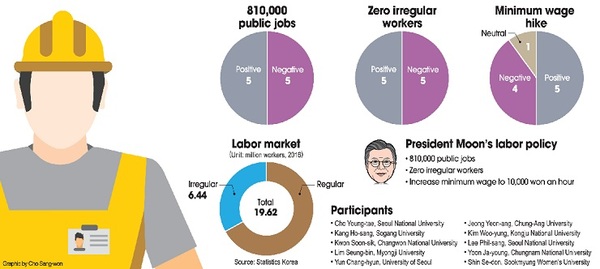
Korea's labor market faces many challenges.
Youth unemployment continues to hit record highs amid digitalization and robotic automation.
The market has become highly inflexible and deeply polarized, with the quality of jobs worsening.
Korea's workforce is aging and declining as the country's population is getting older with a decreasing number of childbirths.
These are further negatively affecting the workplace environment where discrimination grows between regular and irregular workers, even though the OECD said the skill level of the two groups seems to be "broadly similar."
Also, not only has their wage gap widened, but the disparity between male and female workers has increased with about 40 percent of the latter being employed as "irregulars," compared to 26 percent for men.
There are almost 20 million salaried workers here, and more than 6 million of them are irregulars, including dispatched and temporary workers, as of last year.
President Moon Jae-in is seeking to root out this labor disparity as pledged during his election campaign.
His three key labor policy proposals are to create 810,000 jobs in the public sector, reduce the number of irregular public workers to zero and increase the minimum wage to 10,000 won per hour within his term. His pledge includes increasing the hiring of firemen, and policemen and women.
Moon's policy is in line with the OECD's recommendations, which included improving the minimum wage and social insurance benefits for irregular workers to reduce inequality.
His vision to improve the welfare of workers is grand and bold amid Korea's shrinking state coffers and its changing demographics.
Economists here are generally welcoming the former human rights lawyer's move in the face of high youth unemployment and income inequality.
Some say the time is ripe for the state to lead in job creation as the private sector has been reluctant to increase its payrolls, even though facility investments have grown over the past years.
But without thorough planning and delicate budgeting, Moon's policy could lead his administration to inevitably raise taxes to finance the growing public workforce.
"Our hopes for the private sector to lead in job creation have hit a limit. It is now the public sector's turn to improve the job market," said Prof. Kwon Soon-sik at Changwon National University.
"But state-led job creation poses a problem because we would have to raise taxes to finance the workforce in the public sector."
Prof. Lee Phil-sang at Seoul National University agreed that job creation in the public sector could positively push the private sector to follow, as long as the new administration devises a sound policy for small businesses.
"This could generate synergy between the two sectors," Lee said. "But there are concerns whether the government will have the budget in the future to reduce the number of irregulars to zero."
The Korea Times surveyed 10 university professors affiliated with economics, business, public administration, welfare and statistics departments on President Moon's three key labor policies last week.
The survey showed a split response on the three, with one neutral on raising the minimum wage to 10,000 won from 6,470 won an hour.
Prof. Kim Woo-yung at Kongju National University said that the minimum wage has increased every year, and this should be continued.
"But the new administration should not seek to rapidly increase it. It needs to consider economic conditions such as inflation and productivity," Kim said.
"We do need policemen and firemen and women in the public sector. But we also need to tackle the issue of labor market inflexibility before boosting public jobs."
Without this flexibility, the young will end up bearing the social costs of public workers' income, which increases every year on a fixed basis.
"Our labor market will have to become more flexible because of our changing demographics. If the elderly are unable to push back their retirement, the next generation will have to pay the price for the older generation and the public sector," Seoul National University professor Cho Young-tae said.
Jeong Yeon-ang, a professor at Chung-Ang University, also said, "We need to look at how the public sector and its human capital are and can be efficiently managed. The problem is that public job growth could further aggravate the national debt and burden the next generation."
다른 곳에 퍼가실 때는 아래 고유 링크 주소를 출처로 사용해주세요.

